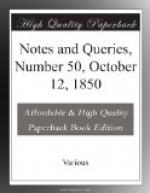“The resemblance of the style, in some parts of the play, to Fletcher’s, was pointed out to me several years ago by Alfred Tennyson (for I do not know why I should not mention his name); and long before that, the general distinctions between Shakspeare’s manner and Fletcher’s had been admirably explained by Charles Lamb in his note on the Two Noble Kinsmen, and by Mr. Spalding in his Essay. And in respect to this I had myself derived additional light, more, perhaps, than I am aware of, from Mr. Hickson himself, if he be (as I suppose he is) the S.H. of the Westminster Review. But having been thus put upon the scent and furnished with principles, I followed the inquiry out by myself, without help or communication. That two independent inquirers should thus have arrived at the same conclusions upon so many particulars, must certainly be considered very singular, except upon one supposition; viz., that the conclusions are according to reason. Upon that supposition, nothing is more natural; and I must confess, for my own part, that I should have been more surprised if the coincidence had been less exact.”
We will borrow one more paragraph from Mr. Spedding’s communication (which is distinguished throughout by the liberality of tone of a true scholar), and we doubt not that the wish expressed at its conclusion is one in which our readers join as heartily as ourselves:—
“I hope, however, that Mr. Hickson may be induced to pursue his own investigation further, and to develop more fully the suggestion which he throws out as to a difference of style discernible in the scenes which he attributes to Shakspeare. If I understand him rightly, he sees traces in this play of the earlier as well as the later hand of both poets. I cannot say that I perceive any indications of this myself, nor, if it be so, can I well make out how it should have come to pass. But I should be glad to hear more about it.”
It will be seen by the following extract from Mr. Emerson’s Representative Men, for which we are indebted to our correspondent A.R., that the subject had attracted the attention of that distinguished writer.—
“In Henry VIII., I think I see plainly the cropping out of the original rock on which his (Shakspeare’s) own finer stratum was laid. The first play was written by a superior, thoughtful man, with a vicious ear. I can mark his lines, and know well their cadence. See Wolsey’s Soliloquy, and the following scene with Cromwell, where, instead of the metre of Shakspeare, whose secret is, that the thought constructs the tune, so that reading for the sense will best bring out the rhythm; here the lines are constructed on a given tune, and the verse has even a trace of pulpit eloquence. But the play contains, through all its length, unmistakeable traits of Shakspeare’s hand; and some passages, as the account of the coronation, are like autographs. What is odd, the compliment to Queen Elizabeth is in the bad rhythm.”
* * * * *




